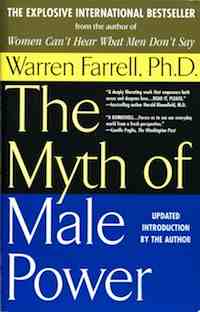The Myth of Male Power
 |
|
| Author | Warren Farrell |
|---|---|
| Country | United States |
| Language | English |
| Subject | Gender Studies, Psychology, Law, Politics |
| Publisher | Berkley Trade |
|
Publication date
|
1993 (Simon and Schuster, 1st ed.) 2000 (Berkely, 2nd edition) |
| Media type | Print (hardcover and paperback) |
| Pages | 488 |
| ISBN | |
| OCLC | 46792833 |
| 305.32 21 | |
| LC Class | HQ1090.3 .F36 2001 |
The Myth of Male Power: Why Men are the Disposable Sex is a 1993 book by Warren Farrell, in which Farrell argues that the widespread perception of men having inordinate social and economic power is false, and that men are systematically disadvantaged in many ways.
Like Herb Goldberg's The Hazards of Being Male, Farrell's The Myth of Male Power is considered a standard of the men's movement, and has been translated into several languages, including German and Italian.
In The Myth of Male Power, Warren Farrell offered his first in-depth outline of the thesis he would eventually apply in his subsequent books—books on communication (Women Can’t Hear What Men Don’t Say), parenting (Father and Child Reunion), and the workplace (Why Men Earn More).
As The Myth of Male Power's title implies, Farrell challenges the belief that men have the power by challenging the definition of power. Farrell defines power as "control over one's life." He writes that, "In the past, neither sex had power; both sexes had roles: women's role was [to] raise children; men's role was [to] raise money."
One of the examples that Farrell uses to illustrate male powerlessness is male-only draft registration. He writes that if any other single group (the examples he lists are Jews, African-Americans, and women) were selected based on their birth characteristics to be the only group required by law to register for potential death, we would call it anti-Semitism, racism or genocidal sexism. Men, he says, have been socialized to call it "glory" and "power," and as a result do not view this as a negative.
Farrell contends that this viewpoint creates psychological problems for both sexes: that "men's weakness is their facade of strength; women's strength is their facade of weakness." He adds that societies have generally socialized boys and men to define power as, in essence, "feeling obligated to earn money someone else spends while we die sooner." Feeling obligated, he contends, is not power.
...
Wikipedia
